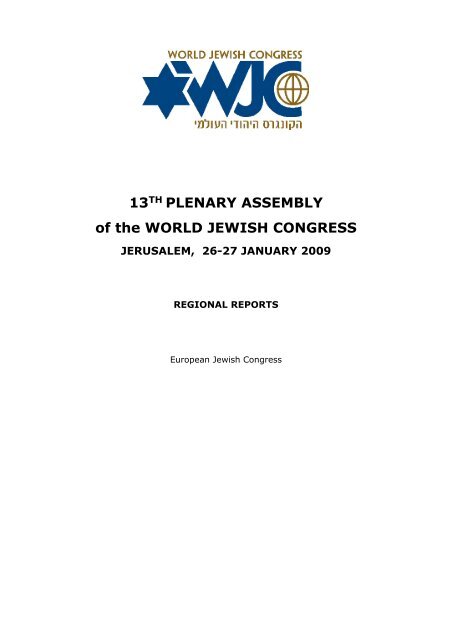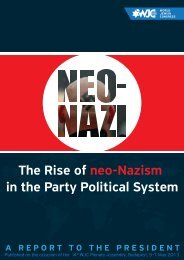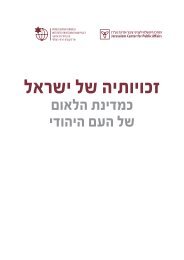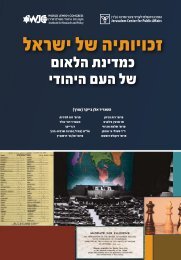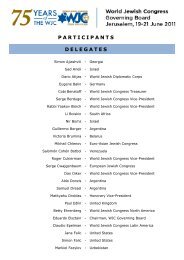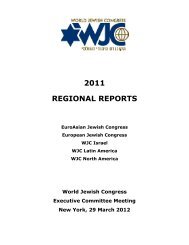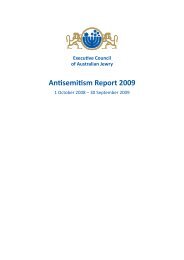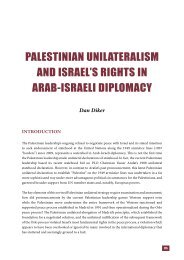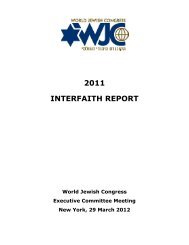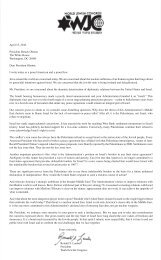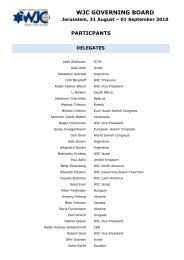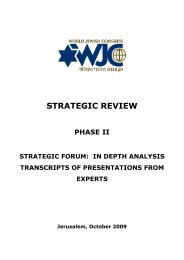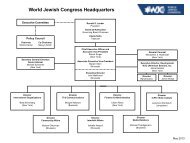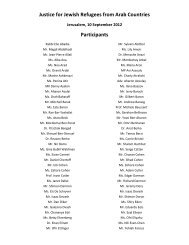European Jewish Congress - World Jewish Congress
European Jewish Congress - World Jewish Congress
European Jewish Congress - World Jewish Congress
Create successful ePaper yourself
Turn your PDF publications into a flip-book with our unique Google optimized e-Paper software.
13 TH PLENARY ASSEMBLY<br />
of the WORLD JEWISH CONGRESS<br />
JERUSALEM, 26-27 JANUARY 2009<br />
REGIONAL REPORTS<br />
<strong>European</strong> <strong>Jewish</strong> <strong>Congress</strong>
EUROPEAN JEWISH CONGRESS REPORT<br />
September 2008 – January 2009<br />
WJC Governing Board<br />
Ashkelon, 24 September 2008<br />
Around 150 delegates and observers from <strong>Jewish</strong> communities from around the world and from affiliated<br />
international <strong>Jewish</strong> organizations traveled to Ashkelon for this meeting.<br />
In his keynote speech, WJC President Ronald S. Lauder urged support for Israel notably in the face of the<br />
increasing Iranian threat and of the dangers posed by Iranian-backed terrorist groups. Maj. Gen. Yoav Galant,<br />
commander of the Israel Defense Forces Southern Command, briefed delegates on the security situation in the<br />
area, and participants were later taken on a tour and shown security installations, including an IDF base.<br />
Inter-faith outreach activities were also discussed by the Governing Board members, and delegates resolved to<br />
give priority to such efforts on the level of national <strong>Jewish</strong> communities. The WJC also launched a program to<br />
increase the representation of young <strong>Jewish</strong> leaders on its main bodies. The Governing Board also decided to<br />
hold the next Plenary Assembly of the <strong>World</strong> <strong>Jewish</strong> <strong>Congress</strong> in January 2009, in Jerusalem.<br />
In attendance from EJC: President Moshe Kantor, Secretary General Serge Cwajgenbaum, Serge Berdugo<br />
(Morocco), Yaakov Bleich (Ukraine), Peter Feldmajer (Hungary), Leonid Levin (Belarus), Silvyo Ovadya<br />
(Turkey), Richard Prasquier (France), Alex Rutman (Latvia).<br />
EJC Present at the Fundamental Rights Platform Meeting of the Fundamental Rights Agency<br />
Vienna, 7-8 October 2008<br />
The Fundamental Rights Platform (FRP), the Fundamental Rights Agency’s (FRA) NGO framework, was<br />
inaugurated in Vienna on the 7-8 of October in a series of roundtable discussions and working groups. EJC’s EU<br />
Liaison Officer Nicolas Stofenmacher was invited to the 2-day meetings and spoke to John Kellock, FRA Head of<br />
Unit Communication and External Relations, inviting the FRA to participate in the Kristallnacht commemoration.<br />
Inaugural Meeting of the <strong>European</strong> Council on Tolerance and Reconciliation<br />
Paris, 10 October 2008<br />
The <strong>European</strong> Council on Tolerance and Reconciliation (ECTR) held its inaugural meeting in Paris on Tuesday, 7<br />
October 2008 under the chair of former Polish President, Aleksander Kwaśniewski and co-chaired by EJC<br />
President Moshe Kantor.<br />
Among the many initiatives promoted by the Council are to recommend a <strong>European</strong> Framework Convention on<br />
Tolerance. This will serve as a pan-<strong>European</strong> initiative to introduce anti-racist laws and practices to every<br />
nation accordingly. The council is also calling for the institution of a <strong>European</strong> Day of Tolerance, and to work<br />
against ethnic, religious and cultural discrimination.<br />
In attendance from EJC: Secretary General Serge Cwajgenbaum, Lisa Aidan (EJC Paris Office).<br />
EJC Present at the Memorial Events of the 65 th Anniversary of the Destruction of the Minsk Ghetto<br />
Minsk, 21 October 2008<br />
The city of Minsk hosted a mourning march and meeting dedicated to the 65th anniversary of the destruction of<br />
the Minsk Ghetto. The events were attended by representatives of international and foreign <strong>Jewish</strong> associations<br />
and communities, religious organisations, Belarusian officials and foreign diplomats.<br />
In his speech, Moshe Kantor, <strong>European</strong> <strong>Jewish</strong> <strong>Congress</strong> and Russian <strong>Jewish</strong> <strong>Congress</strong> President said that Nazis<br />
created 5,000 <strong>Jewish</strong> ghettos in Europe where three million people were killed. In order to make their memory<br />
eternal, the EJC and <strong>European</strong> <strong>Jewish</strong> communities have initiated a project to create museums dedicated to<br />
Europe’s Babi Yars where, among others, the tragedy of Belarusian Jews will be depicted.<br />
EJC Delegation Meets with Turkish Authorities<br />
Ankara, 27-28 October 2008<br />
In Ankara, EJC president Moshe Kantor, accompanied by the president of the Turkish <strong>Jewish</strong> Community Silvyo<br />
Ovadya, secretary general Serge Cwajgenbaum and special advisor Arie Zuckerman held separate meetings<br />
with Prime Minister Recep Tayyip Erdogan, President Abdullah Gul and Foreign Minister Ali Babacan.<br />
Amongst the many topics of discussion were calls for Turkey in its new position as a non-permanent member of<br />
the United Nations Security Council to take a leading role in stabilizing the Middle East, especially in light of the<br />
threat posed by the Iranian nuclear program. The EJC also discussed the idea of an annual inter-faith dialogue,
the Turkish authorities' role in undermining anti-Semitism and racism and Turkey as a bridge to Central Asia for<br />
the <strong>Jewish</strong> community.<br />
The EJC has applauded the Turkish efforts to assist in bringing peace to the Middle East. Turkey's close<br />
strategic alliance with Israel has allowed it to become an important conduit for discussions bringing the<br />
different sides together for negotiations. The Turkish officials acknowledged that there is a great will for peace<br />
on the Israeli and Syrian side and asked the EJC to assist in maintaining this movement towards peace.<br />
Prime Minister Erdogan expressed his hope that the upcoming Israeli elections will not halt the talks with Syria.<br />
Prime Minister Erdogan hopes that his Israeli counterpart Prime Minister Ehud Olmert will continue the process<br />
while in office. The Turkish Prime Minister also said that they would be happy to assist with the negotiations for<br />
the release of captured Israeli soldier Gilad Shalit.<br />
However, the EJC considers it vital for the Turkish authorities to prevent military hardware from Iran passing<br />
through its territory on its way to Lebanon to assist Hezbollah. <strong>European</strong> <strong>Jewish</strong> communities are extremely<br />
worried about the growing nuclear threat emanating from Iran and hope that Turkey in its new role on the<br />
Security Council will push for regional stability and dialogue.<br />
Both the EJC delegation and the Turkish officials expressed concern over the Iranian military nuclear program<br />
and agreed that it was in neither Turkey's nor Europe's interest that Iran amass nuclear weaponry. It is hoped<br />
that in its new position on the Security Council, Turkey will seek practical ways to prevent a nuclear Iran. The<br />
delegation also noted to the Turkish officials that Syria has close ties to terror organizations.<br />
<strong>European</strong> <strong>Jewish</strong> <strong>Congress</strong> President Moshe Kantor stated that Turkey is a model of tolerance and represents an<br />
open and modern form of Islam. The EJC attested to the fact that the <strong>European</strong> day of <strong>Jewish</strong> Culture is<br />
celebrated annually in Turkey where synagogues and other <strong>Jewish</strong> institutions are open to the general public.<br />
President Gul in turn spoke of the strong ties between the EJC and Turkey, which the President regarded as<br />
important. The Turkish President agreed to send Turkish representatives to two of the EJC initiatives, the<br />
<strong>European</strong> Council on Tolerance and Reconciliation (ECTR) and the International Luxembourg Forum on<br />
Preventing Nuclear Catastrophe.<br />
Political Meeting<br />
Paris, 28 October 2008<br />
Myriam Glikerman and Nicolas Stofenmacher met with Ambassador J. Christian Kennedy, US Special Envoy for<br />
Holocaust Issues and Christopher Klein, First Secretary for Political Affairs at the US Embassy to discuss<br />
cooperation for the organization of the upcoming Prague Conference on Holocaust Era Assets in June 2009.<br />
EJC Present at the 175 th Anniversary of Copenhagen’s Great Synagogue, Copenhagen, 2 November 2008<br />
EJC President Moshe Kantor was invited to address the congregation during the celebration of the Copenhagen<br />
Synagogue’s 175 th anniversary in Denmark. Mr. Kantor touched upon several themes during his speech,<br />
including the importance of small <strong>Jewish</strong> <strong>European</strong> communities and how they affect the larger panorama of<br />
<strong>European</strong> Jewry. He recognized that small <strong>Jewish</strong> communities like the one in Copenhagen are models for<br />
activism and resilience, that they are capable of facing issues like assimilation, anti-Semitism and other threats<br />
with vigor. According to Mr. Kantor, these communities are capable of creating frameworks that can be used in<br />
other, larger communities, as well as giving <strong>European</strong> Jewry some its best and brightest leaders and decisionmakers.<br />
EJC Organizes a Series of Events Commemorating the 70 th Anniversary of the Kristallnacht and Promoting<br />
Tolerance in Europe, Brussels, 9-10 November 2008<br />
Two days of events were held in Brussels to commemorate the 70th anniversary of Kristallnacht and to launch<br />
a new program of tolerance across Europe. The events sponsored by the <strong>European</strong> <strong>Jewish</strong> <strong>Congress</strong>, the<br />
<strong>European</strong> Council for Tolerance and Reconciliation, Yad Vashem and the <strong>World</strong> Holocaust Forum were attended<br />
by, amongst others, the President of the <strong>European</strong> Parliament, President of the <strong>European</strong> Commission,<br />
President of the Parliamentary Assembly of the Council of Europe, the Prime Minister of Belgium and a host of<br />
other politicians, diplomats and dignitaries from across Europe.<br />
Beginning with a memorial service at the Great Synagogue of Europe, the over 500 persons gathered were<br />
addressed by EJC president Moshe Kantor, Yisrael Meir Lau, Former Chief Rabbi of Israel, Rabbis Arthur and<br />
Marc Schneier of New York, Chief Rabbi of Brussels Albert Guigui, President of the <strong>Jewish</strong> Community of<br />
Brussels Philip Markiewicz and the cantorial voices of Chazzans Israel and Benjamin Muller. Holocaust survivor<br />
and former Chief Rabbi Yisrael Meir Lau, in his new role as Chairman of the Council of the Yad Vashem<br />
Holocaust Martyrs’ and Heroes’ Remembrance Authority, spoke of a need to remember the Holocaust and<br />
described the events he witnessed as a child in Nazi Europe.<br />
The following day Moshe Kantor and the Chairman of the <strong>European</strong> Council for Tolerance and Reconciliation,<br />
former President of Poland, Aleksander Kwasniewski, laid out the plans for a more tolerant Europe to an<br />
assembled international press corps. Both men stressed the need to actively promote tolerance through the<br />
new formed <strong>European</strong> Council for Tolerance and Reconciliation they created, which has an impressive<br />
membership of former <strong>European</strong> leaders who during their political life supported and instituted tolerant policies<br />
and helped reconcile disparate peoples.
The newly formed council released a ’White Paper on Tolerance’ which listed in detail all the practical measures<br />
that the council would seek to adopt. As senior and respected politicians, the council will seek to lobby<br />
<strong>European</strong> governments to adopt stronger laws and policies against intolerance, racism, xenophobia and anti-<br />
Semitism.<br />
On the same day, a “Special Event on the Promotion of Tolerance throughout the <strong>European</strong> Continent” was held<br />
at the <strong>European</strong> Parliament. The participants, which included many members of <strong>European</strong> Parliament,<br />
representatives of the <strong>European</strong> Commission, foreign ambassadors and dignitaries listened to speeches and<br />
testimonies by the president of the EP Hans-Gert Pöttering, French minister for <strong>European</strong> Affairs Jean Pierre<br />
Jouyet, president of Parliamentary Assembly of the Council of Europe Lluís Maria de Puig, Holocaust survivors<br />
Samuel Pisar and Rabbi Lau, Former president of the Republic of Poland and Chairman of the <strong>European</strong> Council<br />
for Tolerance and Reconciliation Aleksander Kwasniewski and EJC president Moshe Kantor.<br />
During his speech, Kantor suggested that it is the bystanders that are usually most affected and pay the<br />
greatest price. Over 50 million non-Jews and non-Germans died as a result of Nazi aggression whose excesses<br />
were initially tolerated by the watching world.<br />
Speaking at the same event, Hans-Gert Pottering, President of the <strong>European</strong> Parliament, told the audience of<br />
dignitaries "Kristallnacht was the beginning of Auschwitz. Some, many, too many - in the name of appeasement<br />
- failed to see the omen."<br />
Pottering said that lessons from the Holocaust have been learnt by <strong>European</strong>s and this is a major success of the<br />
<strong>European</strong> Union. "We have let ourselves be guided by one particular value which gives the <strong>European</strong> Union its<br />
true soul: this value is tolerance. And it took us centuries to learn this," the President of the <strong>European</strong><br />
Parliament said.<br />
Holocaust survivor and author, Samuel Pisar, spoke at the <strong>European</strong> parliament about the significance of a<br />
worsening economic situation and its history of unleashing extremist forces. "This is a sombre moment in<br />
history. Economic misery always looks for scapegoats and at the fore of the list are always Jews," Pisar said,<br />
noting the rise of Nazism shortly after the ’Great Depression’.<br />
After the conference at the <strong>European</strong> Parliament, a diplomatic dinner was attended by over 60 diplomats and<br />
many more officials. Belgian Prime Minister Yves Leterme was awarded the “Navigator of Jerusalem” Prize for<br />
his commitment against Holocaust denial, anti-Semitism and the anti-Israeli agitation by the Iranian President<br />
Mahmoud Ahmadinedjad. Leterme spoke of his clear affection for Israel in front of an audience which included<br />
many Arab and Muslim ambassadors and officials, many of whom do not have official relations with Israel.<br />
Referring to his award, Leterme said that it was apt that he receive such a gift as much of Europe has taken its<br />
moral compass from Jerusalem which is the birthplace of the three great monotheistic religions.<br />
The guests were addressed as well by vice presidents of the <strong>European</strong> Commission Gunter Verheugen, Jacques<br />
Barrot, PACE president de Puig, president of the <strong>Jewish</strong> Community of Belgium Joel Rubinfeld, Kwasniewski and<br />
Kantor.<br />
The events were sponsored by the <strong>European</strong> <strong>Jewish</strong> <strong>Congress</strong>, the <strong>European</strong> Council for Tolerance and<br />
Reconciliation, Yad Vashem and the <strong>World</strong> Holocaust Forum.<br />
In attendance from EJC: Fero Alexander (Slovakia), Rabbi Yaakov Bleich (Ukraine), Michel Bulz (Luxembourg),<br />
Moses Constantinis and Graciella Bourla (Greece), Serge Cwajgenbaum (EJC), Claudia De Benedetti (Italy),<br />
Alfred Donath (Switzerland), Pinchas Goldschmidt (Russia), Henry Grunwald (UK), Robert Heijmans<br />
(Netherlands), Flo Kaufmann (UK), Ognjen Kraus (Croatia), Tomas Kraus (Czech), Leonid Levin (Belarus),<br />
Aleksandar Necak (Serbia), Joel Rubinfeld (Belgium), Alex Rutman (Latvia), Anne Sender (Norway), Rony<br />
Smolar (Finland), Herbert Winter (Switzerland), Arie Zuckerman (EJF), Lisa Aidan, Nicolas Stofenmacher and<br />
Myriam Glikerman (EJC Paris office).<br />
Also in attendance were: Joseph and Malka Elburg and Rabbi Menachem Sebbag (Netherlands), Rabbi Sorin<br />
Rosen (Romania), Maria and Roger Bauer (UK), David Elhadef (Turkey).<br />
EJC Executive Meeting<br />
Brussels, 10 November 2008<br />
EJC president Moshe Kantor convened an Executive meeting in order to finalize the agenda of the upcoming EJC<br />
extraordinary General Assembly to take place in Brussels on December 17, 2008. The Executive designated the<br />
members of the EJC Credential and Nomination Committee: Rabbi Yaakov Bleich (Chair), Claudia de Benedetti,<br />
Tomas Kraus, Herbert Winter and Serge Cwajgenbaum.<br />
Moshe Kantor presented a report on the EJC political meetings in Ankara and his visit to Copenhagen. Other<br />
topics of discussion were: the question of Shehita and Mila in Europe and the Durban II conference.<br />
In attendance; chairman of the EJC Council Flo Kaufmann (UK), vice presidents Henry Grunwald (UK), Pinchas<br />
Goldschmidt (Russia), Rabbi Yaakov Bleich (Ukraine) and Alex Rutman (Latvia) EJC executive members Tomas<br />
Kraus (Czech), Herbert Winter (Switzerland), Claudia De Benedetti (Italy) and Roger Cukierman representing<br />
Richard Prasquier (France), EJC secretary general Serge Cwajgenbaum and Myriam Glikerman (EJC Paris<br />
office). By special invitation: Alfred Donath (Switzerland).<br />
EJC Sponsors Conference of <strong>European</strong> Rabbis Meeting, Prague<br />
11 November 2008
In Prague, EJC president Moshe Kantor, accompanied by secretary general Serge Cwajgenbaum and executive<br />
director of the Czech <strong>Jewish</strong> community Tomas Kraus attended the Conference of <strong>European</strong> Rabbis EJCsponsored<br />
meeting, which gathered over 300 hundred rabbis from all over Europe. Kantor was the guest<br />
speaker of a dinner organized in his honor.<br />
Other speakers included Chief Rabbis Jonathan Sacks, Yisrael Lau and Pinchas Goldschmidt, as well as Deputy<br />
Prime Minister Cyril Svoboda. EJF secretary general Arie Zuckerman in attendance.<br />
EJC Extraordinary General Assembly<br />
Brussels, 17 December 2008<br />
Moshe Kantor welcomed the over 100 delegates, guests and observers. EJC secretary general Serge<br />
Cwajgenbaum presented an activity report covering the past 10 months of the organization actions. Chairman<br />
of the EJC Council Flo Kaufmann gave introductory remarks on the state of anti-Semitism in Europe, followed<br />
by a detailed presentation by the director of the Community Security Trust, Mike Whine.<br />
EJC vice president Rabbi Yaakov Bleich presided over the elections, explaining the rules of procedure and<br />
calling the delegates to vote.<br />
The results of the elections were as follows:<br />
Moshe Kantor was re-elected as the president of the <strong>European</strong> <strong>Jewish</strong> <strong>Congress</strong> by 55 votes, his challenger<br />
Roger Cukierman collected 28 votes – 1 abstention.<br />
Flo Kaufmann was re-elected Chairman in an uncontested vote.<br />
The newly elected Executive members are: Jose Carp (Portugal), Claudia De Benedetti (Italy), Tomas Kraus<br />
(Czech Republic), Joel Rubinfeld (Belgium), Alex Rutman (Latvia), Roni Smolar (Nordic countries), Ruben Vis<br />
(Netherlands), Herbert Winter (Switzerland), Gusztav Zoltai (Hungary).<br />
The five largest communities retain their permanent membership and the five vice presidents are: Rabbi<br />
Yaakov Bleich (Ukraine), Rabbi Pinchas Goldschmidt (Russia), Henry Grunwald (UK), Charlotte Knobloch<br />
(Germany), Richard Prasquier (France).<br />
All mandates are for 4 years.<br />
In the afternoon session, Ruben Vis (Netherlands) spoke on the increasing threat of <strong>European</strong> restrictions<br />
against <strong>Jewish</strong> ritual practices, namely Shechita and Brit Milah.<br />
Finally, the discussion on the upcoming Durban II conference was led by EJC vice president Henry Grunwald<br />
and the participants shared ideas on how to deal with this potentially inflammatory issue. An EJC Durban II<br />
Task Force was established, which will continue to inform and advise all EJC affiliated members on how their<br />
community can make an impact.<br />
The newly reunited EJC gathered a total of 61 voting delegates, representing 84 votes, with participation from<br />
37 countries. Ireland, Monaco, Slovenia and Tunisia were not able to send delegates.<br />
The Extraordinary GA was preceded on the evening before by a gala dinner co-organized by the CCOJB (Belgian<br />
<strong>Jewish</strong> Community) and the EJC. A special tribute was paid to Szymon Szurmiej, former chair of Social &<br />
Cultural Association of Jews in Poland and director of the Yiddish theatre of Warsaw, on the occasion of his 85th<br />
Birthday, as well as musical entertainment.<br />
EJC Lobbying at the <strong>European</strong> Parliament<br />
Strasbourg, 13-14 January 2009<br />
EJC secretary general Serge Cwajgenbaum and liaison officer Nicolas Stofenmacher were present at the<br />
January plenary session of the <strong>European</strong> Parliament. They met with Joseph Daul (chairman of the EPP-FD<br />
group), Graham Watson (chairman of the ALDE group) and Markus Winkler (head of PSE chairman’s office), as<br />
well as with several MEPs from all parliamentary groups. Had side talks with Elmar Brok (EPP – Germany),<br />
Boguslaw Sonik (EPP - Poland), Harlem Desir (PSE - France), former presidents of EP and MEP Enrique Baron<br />
Crespo (PSE - Spain) and Nicole Fontaine (EPP - France), and political advisor to EP president Pottering,<br />
Alexandre Stutzman.<br />
Topics discussed: <strong>European</strong> Parliament’s resolution on the Israel-Hamas conflict and the passing of a joint<br />
resolution condemning the recent wave of anti-Semitism in Europe.<br />
Cwajgenbaum and Stofenmacher also met with Knesset member Colette Avital, Israel ambassador to EU Ran<br />
Curiel, former Israel ambassador to UN Dan Gillerman and Israeli delegation to the EU.<br />
A rally in support of Israel was organised in Strasbourg by the local <strong>Jewish</strong> Community, the CRIF and the Union<br />
of French <strong>Jewish</strong> Students. Cwajgenbaum, Stofenmacher and Roos took part in it.
Gilbert Roos attended a rare joint meeting of EP delegation to Israel and to Palestine, with the participation of<br />
Isael ambassador to <strong>European</strong> Parliament Ran Curiel and PA representative Leila Shahid.<br />
Report prepared by Serge Cwajgenbaum<br />
EJC Secretary General


